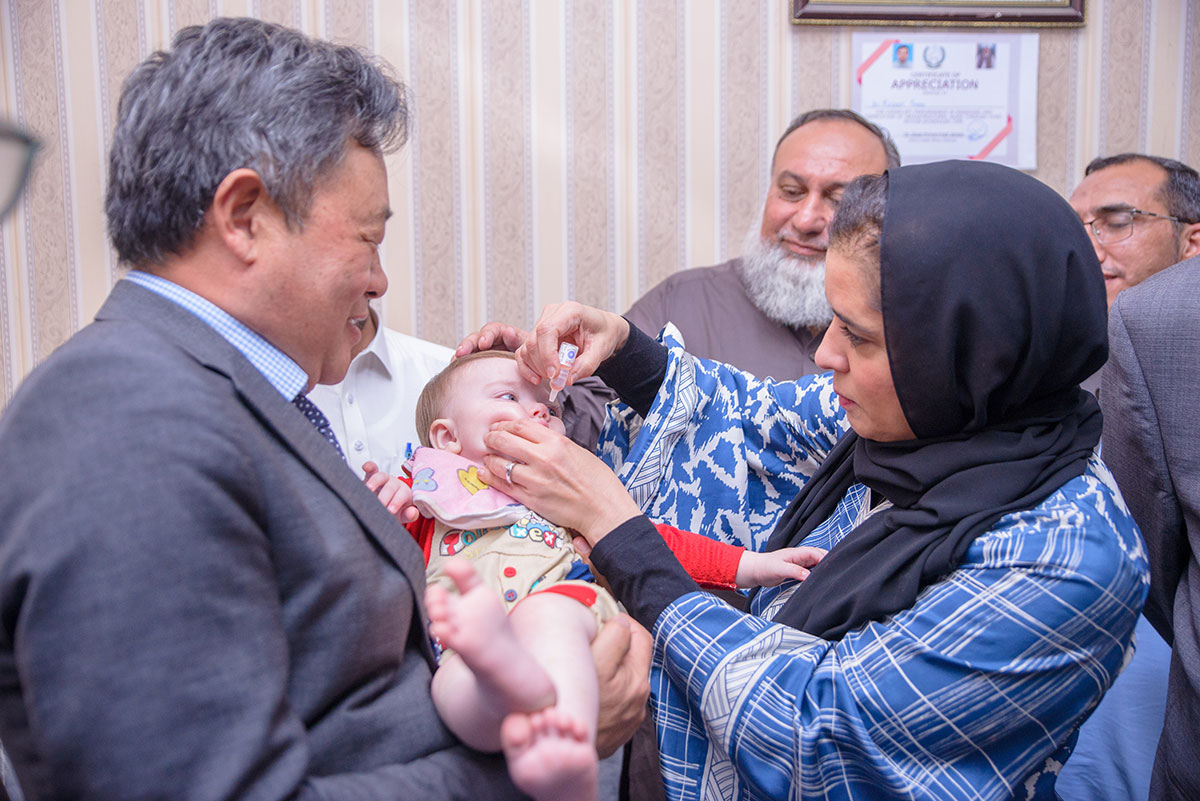 Islamabad, May 4, 2024 –A high-level delegation from the Global Polio Eradication Initiative (GPEI) has concluded a landmark four-day visit to Pakistan at a critical juncture in the fight against polio.
Islamabad, May 4, 2024 –A high-level delegation from the Global Polio Eradication Initiative (GPEI) has concluded a landmark four-day visit to Pakistan at a critical juncture in the fight against polio.
Pakistan is one of only two countries in the world, along with Afghanistan, where wild poliovirus is still endemic, making it central to the work of the GPEI – the largest international public health initiative aiming to end polio globally.
The mission from April 30 to May 3 was the first high-level GPEI visit to Pakistan since the formation of the new government in March. Delegates held intensive discussions with Pakistan’s political and security leadership to address persistent challenges in the final stages of eradication efforts.
Talks focused on the urgent need to strengthen political commitment in Pakistan to eradicate polio and implement innovative strategies to ensure that all children are vaccinated.
The delegation was led by Dr Chris Elias, Chair of the GPEI’s highest decision-making and oversight body, the Polio Oversight Board (POB), and President of Global Development at the Bill & Melinda Gates Foundation. Other members included the World Health Organization (WHO)’s Regional Director for the Eastern Mediterranean Region, Dr Hanan Balkhy, UNICEF South Asia Regional Director Sanjay Wijesekera, the Polio Eradication Branch Chief of the United States Centers for Disease Control (CDC), Dr Omotayo Bolu, and Trustee of the Rotary Foundation and National Polio Plus Committee Chair Aziz Memon.
In Islamabad, they met with Prime Minister Shehbaz Sharif, Acting Foreign Secretary Rahim Hayat Qureshi, Coordinator to the PM on Health Dr Malik Mukhtar Ahmed Bharath and the Pakistan Army’s Engineer-in-Chief, Lt-Gen Kashif Nazir.
“During my time in Pakistan, I have once again been impressed by the commitment from the federal and provincial governments to stopping polio transmission. With continued commitment across the country from leaders, and at all levels, I know the final push to defeat polio will be possible,” said Dr Elias.
The delegation also visited Peshawar and Lahore, where they met with the provincial chief ministers of Khyber Pakhtunkhwa and Punjab, as well as provincial health ministers and chief secretaries, to discuss progress and challenges in polio eradication.
“Engaging with Pakistan’s new political leadership during this visit has demonstrated the commitment of all partners to polio eradication, but we must use the coming months to leverage this commitment wisely, or we risk losing the momentum and the confidence that we can get the job done,” commented Dr Balkhy. “Pakistan has the real opportunity to stop the endemic strain of poliovirus that has been restricted to south Khyber Pakhtunkhwa province. Strengthening tailored responses to the increased detection of the imported poliovirus in historic reservoirs is going to be critical to prevent largescale outbreaks in the coming months.”
Pakistan has made significant progress in reducing polio cases and eliminating diverse poliovirus strains in recent years. However, several persistent challenges have prevented the complete eradication of the disease, including disruptions to vaccination campaigns caused by insecurity, children being missed in vaccine campaigns and community distrust.
“We know what to do; we know how to do it. It is incumbent on all of us – government, health workers, partners and communities – to work together determinedly to keep every child in Pakistan safe from this deadly and preventable disease,” said Mr Wijesekera.
The delegation highlighted the critical need to reach migrant populations in infected and high-risk districts, noting that experience in India had shown the value of tailored strategies focusing vaccination efforts on thoroughly mapped migrant populations.
They also emphasized the importance of routine immunization in sustaining hard-won gains in polio eradication. Collaboration with the Expanded Programme on Immunization (EPI) was paramount, particularly in areas with pressing health needs.
Stronger political commitment was identified as essential for addressing legitimate demands for services from deprived communities and galvanizing health workers. The delegation advised leaders to leverage their influence and support to engage community influencers and so help ensure comprehensive community participation in vaccination.
Aziz Memon commented: “Rotary International congratulates the Government of Pakistan on its progress in the fight against polio and encourages a renewed and urgent commitment to addressing the remaining challenges the Polio Programme faces.”
“Rotary has invested almost US$427 million in polio eradication efforts in the country and affirms our continued support to the Polio Programme until the goal is accomplished and all children in Pakistan are protected from polio.”
The visit coincided with an immunization campaign from April 29 to May 6 aimed at vaccinating over 24.4 million children under the age of five in 91 districts.


